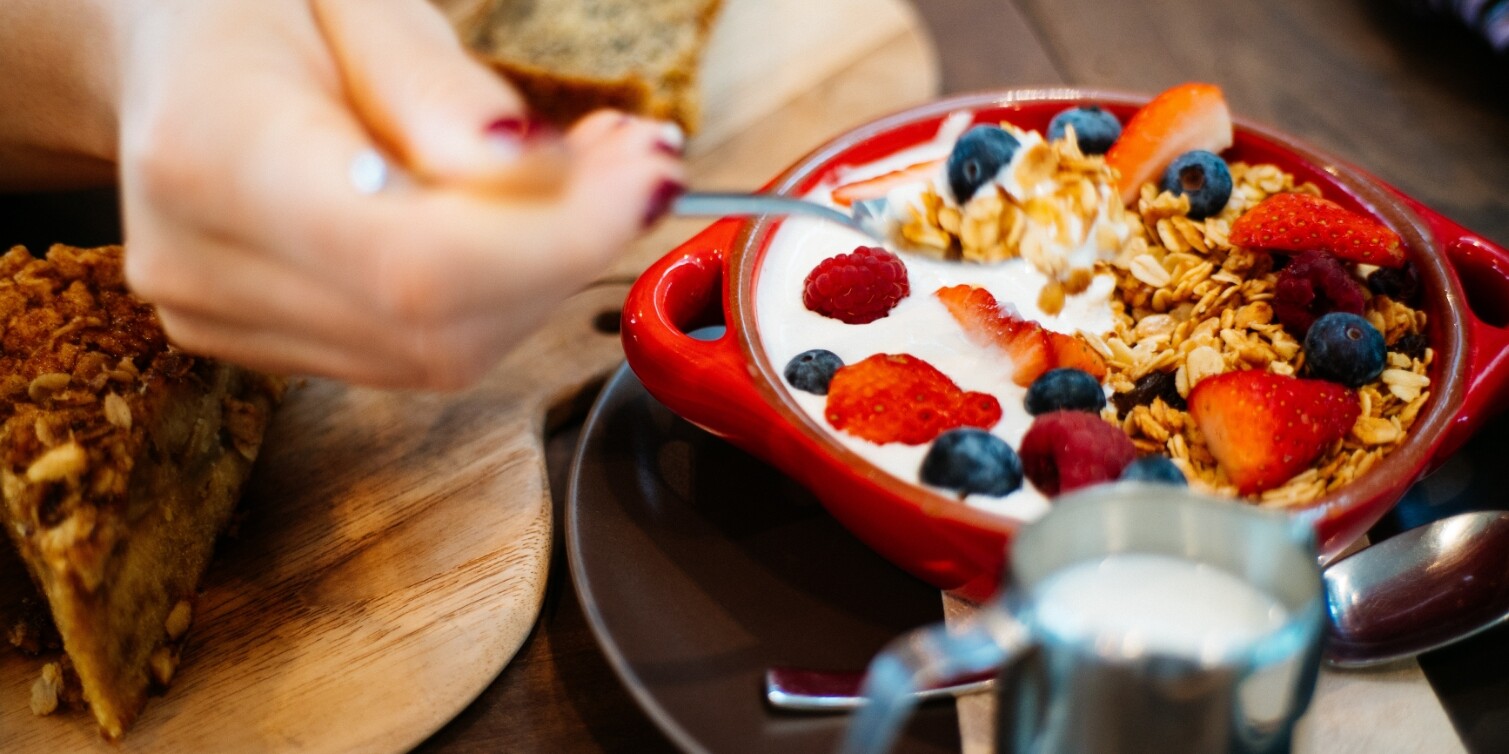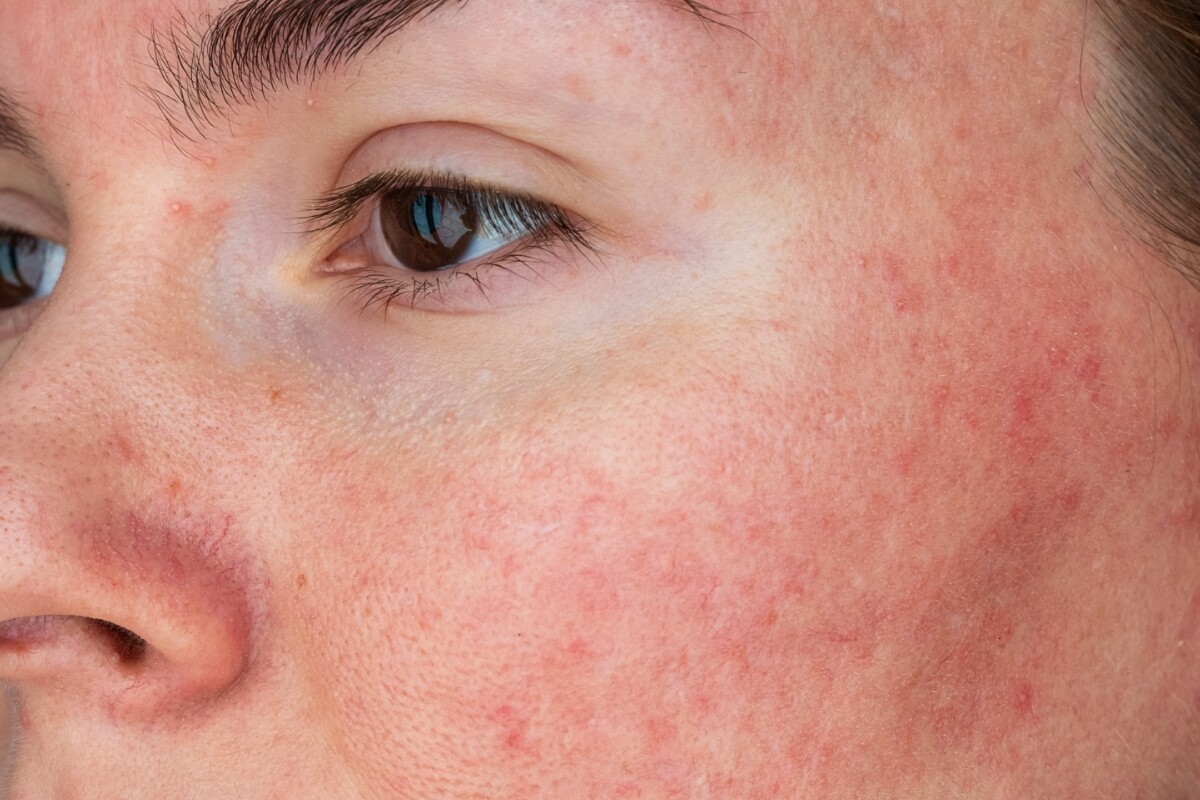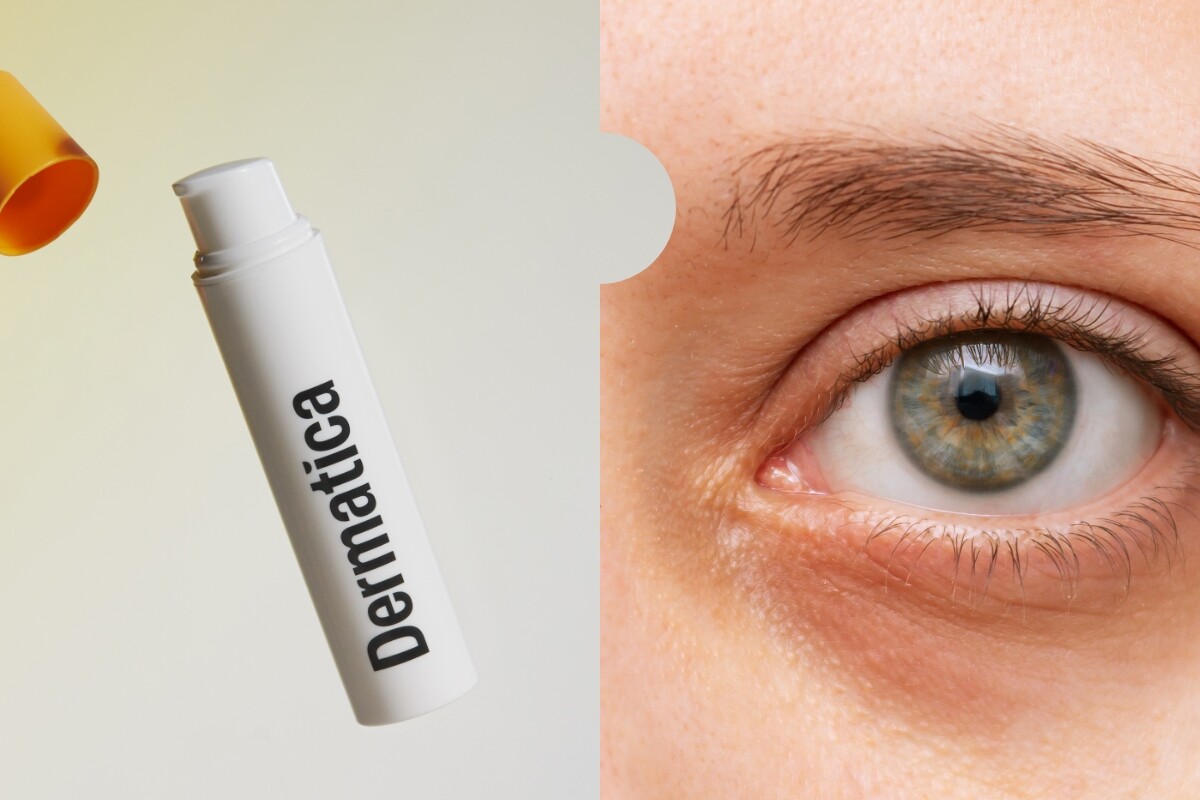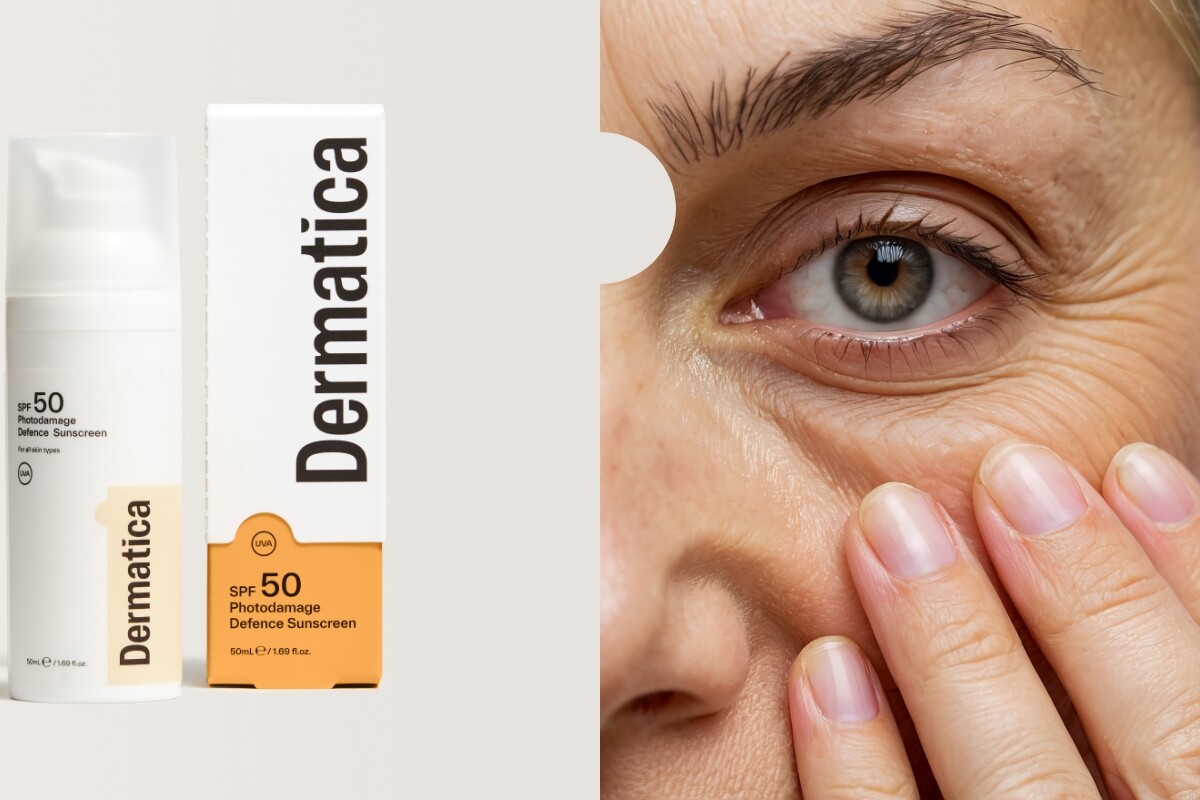If you knew for sure that certain foods were causing your acne, you’d avoid them, right? If only it were that simple.
Experts understand fairly well the role of genetics and hormones in acne, but there are other factors that are less clear. Sadly, diet is one of them.
Here’s what we know so far — and advice on what best to eat for clear skin.
First, why have I got acne?
It feels unfair. Why are you dealing with skin that breaks out, while friends are blemish free?
Unfortunately, there’s no easy answer to this. A host of factors are at play, the most important being genetics. Yes, you can probably blame skin issues on your family history.
Studies in identical twins — who share the same genetic makeup — suggest that genes account for 80% of acne. This means that in most cases either each twin or neither will have the condition.
The other 20% of the risk is down to factors that vary from person to person, and aren’t associated with any genetic tendency. This is why many experts think diet might play a role.
How does acne start?
But the processes that contribute to acne may also be impacted by diet. Acne is characterised by inflammation, excess sebum (oil) production, build-up of skin cells (hyper-keratinisation) and an increase in skin bacteria called C acnes. s.
One example is insulin, which affects levels of another hormone called insulin-like growth factor (IGF-1). This in turn is involved in various cellular processes that impact sebum production and skin cell turnover. Insulin levels are affected by the sugar we eat.
Which foods affect acne?
Sadly, it’s not easy to say. Although there’s plenty of anecdotal evidence for dietary influences on acne — who hasn’t been told to avoid chocolate? It’s unlikely that a single food will change your skin significantly but ask doctors to make specific recommendations.
But there’s a lot of research ongoing, which is starting to build up a picture of what might help.
Glycemic index/load
Glycemic index/load is looking like the most promising area of research when it comes to diet and acne.
The Glycemic index (GI) rates foods according to how fast your body breaks them down into sugar. Foods that your body breaks down quickly cause a rapid spike in blood sugar. These have a high GI. Examples include sweets, chocolate and sugary drinks, white bread and white rice. Foods that break down more slowly — such as whole grains, vegetables and pulses — have a lower GI.
The term glycemic load (GL) simply takes account of the amount of these foods. So a single sweet, which is a high-GI food, has a lower GL than a large handful of sweets.
Several studies have shown that people with acne seem to eat higher-GL diets than those without. And there’s some evidence that switching to a low-GL diet may reduce the number of acne lesions.
Scientists have also noted the complete absence of acne among certain groups of people who live on isolated islands with no access to processed, Western foods. But it’s not clear whether this is due to dietary GL, or other elements of the Western lifestyle.
The evidence suggests that trying to stick to foods that release sugars gradually, avoiding sugar spikes and surges in insulin, might be worth a try. For more information, have a look at the NHS article on the glycemic index.
Dairy
Although it often gets the blame as a spot-causing culprit, there’s mixed evidence for the impact of dairy on acne. Some studies have found a link with milk consumption, and in some cases, this link has only been shown with skimmed milk.
But the same association has not been seen with cheese. This raises the possibility that the acne connection is actually due to the effect of dairy on blood sugar, rather than specific dairy proteins.
There just isn’t enough evidence to advise every acne sufferer to give up dairy. But some people might find it helps. Keep in mind that if you do decide to skip dairy, it’s important to get your calcium from other sources.
Fats
There’s some weak evidence that the types of fats you eat could impact your acne. For example, some studies have shown a link between low fish intake and increased acne. And a diet high in trans-fat and saturated fat may also be a contributing factor.
In one study, adding an omega-3 fatty acid supplement reduced acne.
But again the number of studies is low, and there isn’t yet enough evidence to make definite recommendations. For good health, everyone should include omega-3 fats from fish, and try to limit trans-fats and saturated fats. These are generally found in animal products including meat and dairy.
What about chocolate?
The jury is still out on this one. In one study, men with acne were given capsules with either unsweetened 100% cocoa, or a control capsule. There was a statistically significant increase in acne in the cocoa group.
Other studies have also shown a link between acne and daily snacking on chocolate and sweets. But we don’t know if, again, this could just be due to all the sugar and the surges in insulin that follow.
And there’s another issue — acne can have a significant emotional impact. So could some of the acne-chocolate links be explained by comfort eating?
In short, more studies are needed before we can give definite no-chocolate advice. But if it triggers flare-ups, you might prefer to go without.
Acne advice
The best advice is to listen to your own body. If you’ve noticed that chocolate milkshakes bring on a break-out, it makes sense to avoid them.
It may not be what you want to hear, but the medical recommendation for people with acne is simply to eat a healthy, balanced diet. This should include:
Plenty of sources of high-quality protein such as lean meat, fish and pulses
Wholegrain foods rather than processed white versions.
At least 5 a day, including a colourful, varied mix of fruit and vegetables
Very little — if any — sugary, processed food and drink
This way, your diet should be naturally nutrient-rich, have a low GL, be low in trans fats and supply enough omega-3 oils.
It’s important to remember that we’re still learning what causes acne itself before we can fully understand what part of the diet has to play. You can have a perfectly balanced diet, but still have severe acne, so it’s important to take any comments or advice that you see on foods exacerbating acne with a large pinch of salt.
It’s not recommended to exclude any types of food or food groups without the guidance of an expert. If you want to get any more personalised information, we recommend speaking to your Dermatologist, GP or registered dietitian as they are the best-qualified people to help.
References
1. Bataille et al. https://www.sciencedirect.com/science/article/pii/S0022202X15301019
2. Baldwin, H., Tan, J. Effects of Diet on Acne and Its Response to Treatment. Am J Clin Dermatol 22, 55–65 (2021). https://doi.org/10.1007/s40257-020-00542-y
3. Baldwin, H., Tan, J. Effects of Diet on Acne and Its Response to Treatment. Am J Clin Dermatol 22, 55–65 (2021). https://doi.org/10.1007/s40257-020-00542-y
4. Acne vulgaris. Clinical Knowledge Summaries. https://cks.nice.org.uk/topics/acne-vulgaris/management/primary-care-management/, revised June 2021
5. Cordain, L. (2005, June). Implications for the role of diet in acne. In Seminars in cutaneous medicine and surgery (Vol. 24, No. 2, pp. 84-91). WB Saunders.
6. NHS. What is the glycaemic index? www.nhs.uk/common-health-questions/food-and-diet/what-is-the-glycaemic-index-gi/, reviewed June 2022
7. Baldwin, H., Tan, J. Effects of Diet on Acne and Its Response to Treatment. Am J Clin Dermatol 22, 55–65 (2021). https://doi.org/10.1007/s40257-020-00542-y
8. Baldwin, H., Tan, J. Effects of Diet on Acne and Its Response to Treatment. Am J Clin Dermatol 22, 55–65 (2021). https://doi.org/10.1007/s40257-020-00542-y
9. Baldwin, H., Tan, J. Effects of Diet on Acne and Its Response to Treatment. Am J Clin Dermatol 22, 55–65 (2021). https://doi.org/10.1007/s40257-020-00542-y
10. Cordain, L. (2005, June). Implications for the role of diet in acne. In Seminars in cutaneous medicine and surgery (Vol. 24, No. 2, pp. 84-91). WB Saunders.
11. Adebamowo C, Spiegelman D, Berkey C, Danby F, Rockett H, Colditz G, et al. Milk consumption and acne in teenaged boys. J Am Acad Dermatol. 2008;58(5):787–93.
12. Baldwin, H., Tan, J. Effects of Diet on Acne and Its Response to Treatment. Am J Clin Dermatol 22, 55–65 (2021). https://doi.org/10.1007/s40257-020-00542-y
13. NHS Eat Well. Dairy and alternatives in your diet. www.nhs.uk/live-well/eat-well/food-types/milk-and-dairy-nutrition/, reviewed January 2021
14. Baldwin, H., Tan, J. Effects of Diet on Acne and Its Response to Treatment. Am J Clin Dermatol 22, 55–65 (2021). https://doi.org/10.1007/s40257-020-00542-y
15. Jung J, Kwon H, Hong J, Yoon J, Park M, Jang M, et al. Effect of dietary supplementation with omega-3 fatty acid and gamma-linolenic acid on acne vulgaris: a randomised, double-blind, controlled trial. Acta Derm Venereol. 2014;94:521–5.
16. NHS Eat Well. Fat: the facts. www.nhs.uk/live-well/eat-well/food-types/different-fats-nutrition/, reviewed April 2020.
17. Caperton C, Block S, Viera M, Keri J, Berman B. Double-blind, placebo-controlled study assessing the effect of chocolate consumption in subjects with a history of acne vulgaris. J Clin Aesthet Dermatol. 2014;7(5):19–23.
18. Acne vulgaris. Clinical Knowledge Summaries. https://cks.nice.org.uk/topics/acne-vulgaris/management/primary-care-management/, revised June 2021
Jane McQueen
Jane McQueen is a medical copywriter with over 15 years of experience in health content. She’s worked across all healthcare sectors, creating evidence-based content on topics from skincare to mental health. She has a life sciences background, with a degree in physiology and a PgDip in public health.
Dr Catriona Maybury
Dr Catriona Maybury is a Consultant Dermatologist, working as Medical Lead for Dermatica and at St George’s Hospital in London. Catriona completed her specialty training at St John’s Institute of Dermatology in London. Catriona has a special interest in medical dermatology, completing a PhD in liver fibrosis amongst psoriasis patients at King’s College London. Catriona is a certified coach and worked as Dermatology Section Editor for the British Medical Journal.





